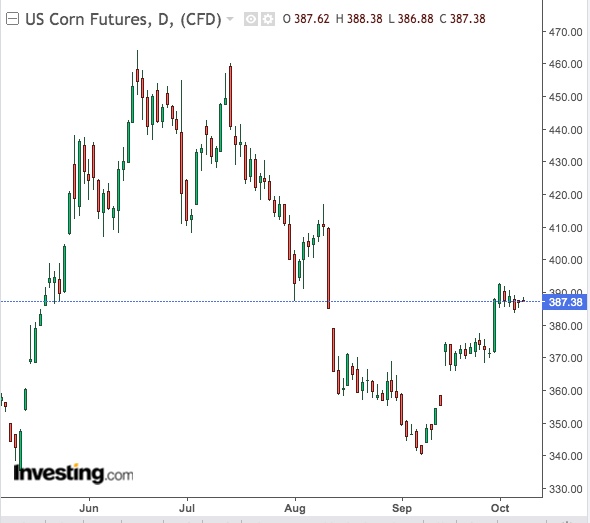Wall St futures flat amid US-China trade jitters; bank earnings in focus
Tired of range-bound oil and gold markets? Take a look at America’s golden crop, corn, which is enticing investors to go long, just as other commodities are wilting under the weight of the mighty dollar.
Delayed plantings and a political bear hug from President Donald Trump to ethanol producers could combine in the second prize bonanza since summer for corn, the largest U.S. crop.
Freeze And Inclement Weather Hit Corn Crop
U.S. corn futures are on track to a fifth straight weekly gain as rapidly changing weather brings a hard freeze to much of the western and northern reaches of the corn/soy belt. In the Northern Plains and Minnesota, there’s even the likelihood of snow—yes, this early into fall—on Saturday.
Dan Hueber, a veteran agricultural analyst, sounded a caution on Monday on the production squeeze expected for corn from cooler temperatures and inordinate moisture, running from Minnesota to the Northwest and the Great Lakes across the Northern Plains to eastern New Mexico.Said Hueber:
“Certainty neither is welcome news for crops that are behind average for this date.”
Heavy Shorting In Corn Signaling Long Rebound
He and other analysts watching fund managers’ positioning in corn also noticed something else: Too many were still shorting futures on the Chicago Mercantile Exchange.
According to the weekly Commitment of Traders report from Friday, large speculators were still short on 376,055 contracts versus longs at 362,049. The net short of 14,006 could be flipped in a week and there’s potential for a long and lasting rally.
After settling Monday’s trade at under $3.88 per bushel, corn futures are likely to breach $4 if they maintain their present trajectory, charts show.

The last time that happened was in the course of a nine-week stretch between late May and July, when prices reached a five-year high above $4.64.
That breakout came after a similar pattern of under plantings in spring. However, the early-summer explosion in corn prices turned out to be a bull trap, with net losses of nearly 17% for longs in the three months to August.
There is no certainty yet how the current round will end.
Advice To Corn Bulls: Plan Trade Stops To Avoid Summer Disaster
Eric Scoles, commodity market strategist at RJO Futures in Chicago, however, said those nimble with well-positioned stops should be able to avoid getting crushed in price collapses.Scoles urged traders to closely follow crop progress reports by the U.S. Department of Agriculture, the next of which falls on Thursday. The pre-USDA report breakdown for corn is estimated at 13.636 billion bushels, derived from a harvested acreage of 81.57 million and a yield of 167.1 bushels per annum. Said Scoles:
“We’ve seen already stocks could be far below previous estimates. Crop maturity is well behind normal, and the previous USDA reports were suspicious at best.”
“This summer’s dramatic (market) rise and fall has left many traders and farmers frustrated. It’s possible that if the bull case is proven accurate in upcoming reports, there could be a buying frenzy from those who got burned this summer.”
'Fair' Upside [[0|Target]] At $3.98?
Scoles also pointed out that the front-month December corn contract on the Chicago Mercantile Exchange was exhibiting what appeared like “a classic bull flag on the daily chart, after a gap-filling rally sparked by bullish news.”
“It’s typical for a market to pause or pull back slightly before making its next move with fundamental support and I think that is what we are seeing here now.”
“I think a fair target for the next leg up could be about $3.980.”
Investing.com’s Daily Technical Outlook has a “Strong Buy” recommendation for December corn, with top-end resistance pegged at $3.9038.
White House Help For Ethanol
Another unexpected boon for corn could come from the White House, with Trump bowing to pressure from ethanol millers and Midwestern corn farmers to raise the biofuel’s mandated quantity in gasoline blends ahead of next year's presidential election.
Ethanol is primarily made from corn, a major crop and industry in the Midwestern states that proved crucial to Trump's 2016 victory. Under a plan announced on Friday, oil refineries would be required to blend at least 15 billion gallons of ethanol into the nation's fuel supply beginning next year, up from what in practice was less than 14 billion.
Crude oil refiners across Texas were reportedly fuming at the decision, as they had lobbied the president for more than a year to reduce the ethanol additive in gasoline, which they say adds unnecessarily to costs. Ethanol was originally mandated to reduce the amount of imported crude oil required by local refiners when processing gasoline—but now refiners argue it has become redundant, after the boom in shale oil production has made the United States the world’s largest producer, away from crude.
Gasoline’s Loss Is Corn’s Gain
According to Scientific American, roughly 40% of U.S. corn is used for making ethanol. Scott Segal, a Washington-based attorney for the refining industry, didn’t miss the significance of this, as he remarked in a weekend story in the Houston oil publication, Chron:
"With the ethanol industry, too much is never enough. The administration really has no assurance that agribusiness won't demand more and more, just as they always have."
Gasoline’s loss in this case seems to be the gain of ethanol—or, more precisely, corn.
